In the early days of transportation, the female convicts were absorbed into the community, predominantly as workers, servants & wives. The numbers were not so great as to create a serious problem for the authorities. As time progressed, however, more & more female convicts began to arrive.
Newcastle opened up as a place of secondary transportation following the attempted rebellion at Castle Hill in March of 1804. Those convicts who continued to offend would now be sent north to Newcastle which was considered a sufficient distance from Sydney to discourage most would-be escapees. The need for domestic servants & wives increased as the free population grew.
To learn more about how female convicts were assigned in Newcastle and throughout the Hunter, as well as information on individual women, listen to our podcast Women Assigned in the podcasts section.
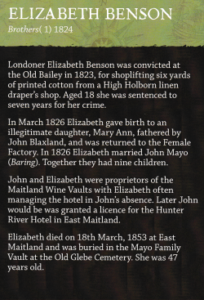 Brothers(1) 1824
Brothers(1) 1824
Londoner Elizabeth Benson was convicted at the Old Bailey in 1823, for shoplifting six yards of printed cotton from a High Holborn linen draper’s shop. Aged 18 she was sentenced to seven years for her crime.
In March 1826 Elizabeth gave birth to an illegitimate daughter, Mary Ann, fathered by John Blaxland, and was returned to the Female Factory. In 1826 Elizabeth married John Mayo (Baring). Together they had nine children.
John and Elizabeth were proprietors of the Maitland Wine Vaults with Elizabeth often managing the hotel in John’s absence. Later John would be was granted a licence for the Hunter River Hotel in East Maitland.
Elizabeth died on 18th March, 1853 at East Maitland and was buried in the Mayo Family Vault at the Old Glebe Cemetery. She was 47 years old.
 Elizabeth (5) 1836
Elizabeth (5) 1836
Louisa was a married woman with one female child when she was transported, convicted of simple larceny at the Old Bailey.
Life in the colony for Louisa wasn’t very easy. She found herself on the wrong side of the law on numerous occasions; for absconding from service, being drunk & disorderly and stealing, and was sentenced to a few stints in the cells at Newcastle and Parramatta. She had her Ticket of Leave and Certificate of Freedom cancelled due to her behaviour.
In 1852, Louisa stole a sheet from the Benevolent Asylum, where she was receiving charity. Her punishment for this offence was six months hard labour in Sydney Gaol.
Louisa died in September, 1852. An inquest into her death returned a verdict of “died from the effects of intemperance”. She was 42 years old.
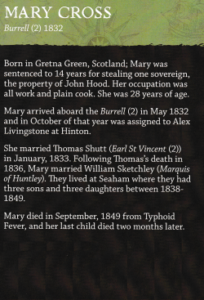 Burrell (2) 1832
Burrell (2) 1832
Born in Gretna Green, Scotland; Mary was sentenced to 14 years for stealing one sovereign, the property of John Hood. Her occupation was all work and plain cook. She was 28 years of age.
Mary arrived aboard the Burrell (2) in May 1832 and in October of that year was assigned to Alex Livingstone at Hinton.
She married Thomas Shutt (Earl St Vincent (2)) in January, 1833. Following Thomas’s death in 1836, Mary married William Sketchley (Marquis of Huntley). They lived at Seaham where they had three sons and three daughters between 1838- 1849.
Mary died in September, 1849 from Typhoid Fever, and her last child died two months later.
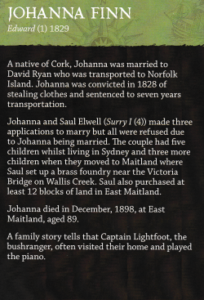 Edward (1) 1829
Edward (1) 1829
A native of Cork, Johanna was married to David Ryan who was transported to Norfolk Island. Johanna was convicted in 1828 of stealing clothes and sentenced to seven years transportation.
Johanna and Saul Elwell (Surry I (4)) made three applications to marry but all were refused due to Johanna being married. The couple had five children whilst living in Sydney and three more children when they moved to Maitland where Saul set up a brass foundry near the Victoria Bridge on Wallis Creek. Saul also purchased at least 12 blocks of land in East Maitland.
Johanna died in December, 1898, at East Maitland, aged 89.
A family story tells that Captain Lightfoot, the bushranger, often visited their home and played the piano.
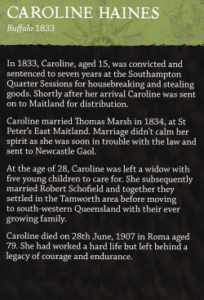 Buffalo 1833
Buffalo 1833
In 1833, Caroline, aged 15, was convicted and sentenced to seven years at the Southampton Quarter Sessions for housebreaking and stealing goods. Shortly after her arrival Caroline was sent on to Maitland for distribution.
Caroline married Thomas Marsh in 1834, at St Peter’s East Maitland. Marriage didn’t calm her spirit as she was soon in trouble with the law and sent to Newcastle Gaol.
At the age of 28, Caroline was left a widow with five young children to care for. She subsequently married Robert Schofield and together they settled in the Tamworth area before moving to south-western Queensland with their ever growing family.
Caroline died on 28th June, 1907 in Roma aged 79. She had worked a hard life but left behind a legacy of courage and endurance.
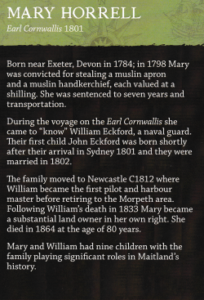 Earl Cornwallis 1801
Earl Cornwallis 1801
Born near Exeter, Devon in 1784; in 1798 Mary was convicted for stealing a muslin apron and a muslin handkerchief, each valued at a shilling. She was sentenced to seven years and transportation.
During the voyage on the Earl Cornwallis she came to “know” William Eckford, a naval guard. Their first child John Eckford was born shortly after their arrival in Sydney 1801 and they were married in 1802.
The family moved to Newcastle C1812 where William became the first pilot and harbour master before retiring to the Morpeth area. Following William’s death in 1833 Mary became a substantial land owner in her own right. She died in 1864 at the age of 80 years.
Mary and William had nine children with the family playing significant roles in Maitland’s history.
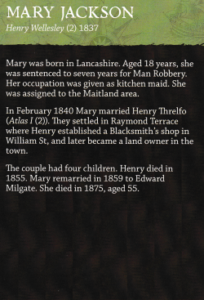 Henry Wellesley (2) 1837
Henry Wellesley (2) 1837
Mary was born in Lancashire. Aged 18 years, she was sentenced to seven years for Man Robbery. Her occupation was given as kitchen maid. She was assigned to the Maitland area.
In February 1840 Mary married Henry Threlfo (Atlas I (2)). They settled in Raymond Terrace where Henry established a Blacksmith’s shop in William St, and later became a land owner in the
town.
The couple had four children. Henry died in 1855. Mary remarried in 1859 to Edward Milgate. She died in 1875, aged 55.
 Elizabeth I (2) 1818
Elizabeth I (2) 1818
A native of Waterford, Ireland, Margaret was convicted of stealing in 1817 and sentenced to seven years transportation. Her husband James McGreavy (Chapman (1)) had previously been transported.
Margaret arrived in Sydney in 1818 together with her daughter Mary Ann. By 1820 she and James were living together in Sydney, however, having been convicted of further crimes in the colony were sent to Newcastle.
After time in Port Macquarie the family returned to Newcastle where James took up the publican’s licence of the Star and Garter Inn and then the Queen Victoria Inn After his death in 1846 the licence passed to Margaret who held it until
1858.
Margaret McGreavy died on 9 December 1865 She is remembered as a pioneer of the Newcastle East End and matriarch of a large family of descendants
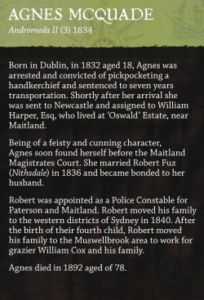 Andromeda II (3) 1834
Andromeda II (3) 1834
Born in Dublin, in 1832 aged 18, Agnes was arrested and convicted of pickpocketing a handkerchief and sentenced to seven years transportation. Shortly after her arrival she was sent to Newcastle and assigned to William Harper, Esq, who lived at ‘Oswald’ Estate, near Maitland.
Being of a feisty and cunning character, Agnes soon found herself before the Maitland Magistrates Court. She married Robert Fuz (Nithsdale) in 1836 and became bonded to her husband.
Robert was appointed as a Police Constable for Paterson and Maitland. Robert moved his family to the western districts of Sydney in 1840. After the birth of their fourth child, Robert moved his family to the Muswellbrook area to work for grazier William Cox and his family.
Agnes died in 1892 aged of 78.
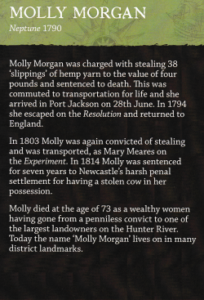 Neptune 1790
Neptune 1790
Molly Morgan was charged with stealing 38 ‘slippings’ of hemp yarn to the value of four pounds and sentenced to death. This was commuted to transportation for life and she arrived in Port Jackson on 28th June. In 1794 she escaped on the Resolution and returned to England.
In 1803 Molly was again convicted of stealing and was transported, as Mary Meares on the Experiment. In 1814 Molly was sentenced for seven years to Newcastle’s harsh penal settlement for having a stolen cow in her possession.
Molly died at the age of 73 as a wealthy women having gone from a penniless convict to one of the largest landowners on the Hunter River. Today the name ‘Molly Morgan’ lives on in many district landmarks.
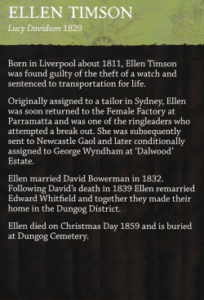 Lucy Davidson 1829
Lucy Davidson 1829
Born in Liverpool about 1811, Ellen Timson was found guilty of the theft of a watch and sentenced to transportation for life.
Originally assigned to a tailor in Sydney, Ellen was soon returned to the Female Factory at Parramatta and was one of the ringleaders who attempted a break out. She was subsequently sent to Newcastle Gaol and later conditionally assigned to George Wyndham at ‘Dalwood’ Estate.
Ellen married David Bowerman in 1832. Following David’s death in 1839 Ellen remarried Edward Whitfield and together they made their home in the Dungog District.
Ellen died on Christmas Day 1859 and is buried at Dungog Cemetery.
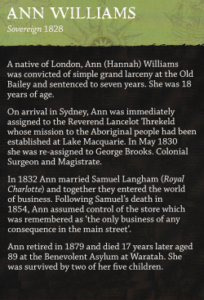 Sovereign 1828
Sovereign 1828
A native of London, Ann (Hannah) Williams was convicted of simple grand larceny at the Old Bailey and sentenced to seven years. She was 18 years of age.
On arrival in Sydney, Ann was immediately assigned to the Reverend Lancelot Threkeld whose mission to the Aboriginal people had been established at Lake Macquarie. In May 1830 she was re-assigned to George Brooks. Colonial Surgeon and Magistrate.
In 1832 Ann married Samuel Langham (Royal Charlotte) and together they entered the world of business. Following Samuel’s death in 1854, Ann assumed control of the store which was remembered as ‘the only business of any consequence in the main street’.
Ann retired in 1879 and died 17 years later aged 89 at the Benevolent Asylum at Waratah. She was survived by two of her five children.